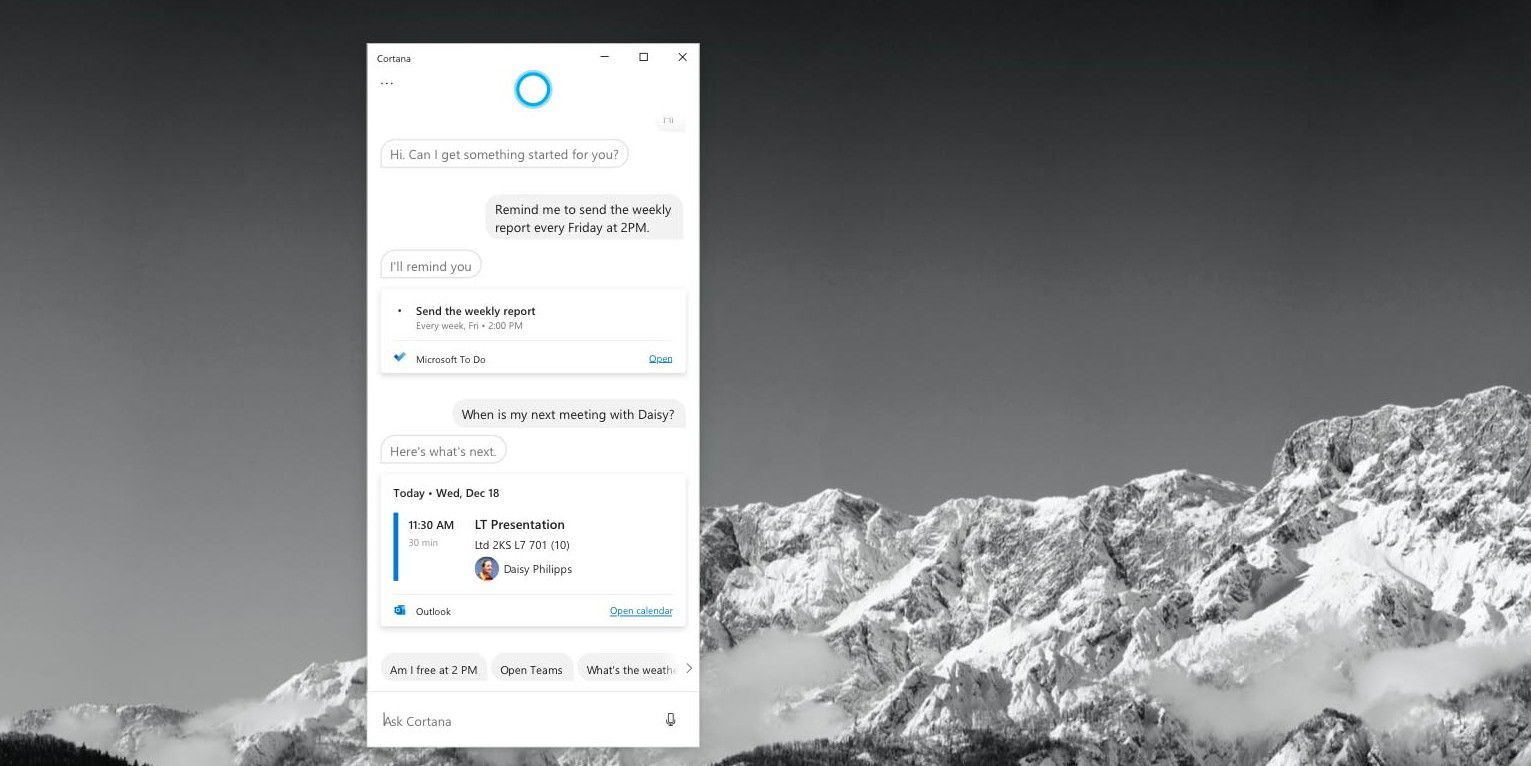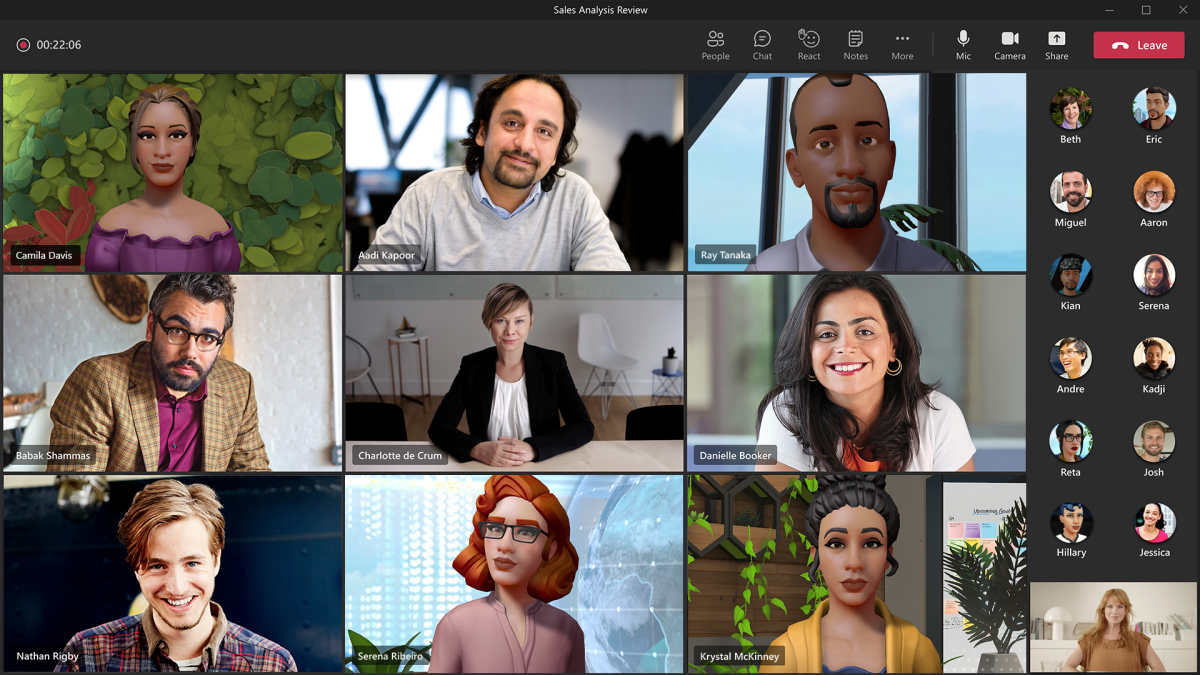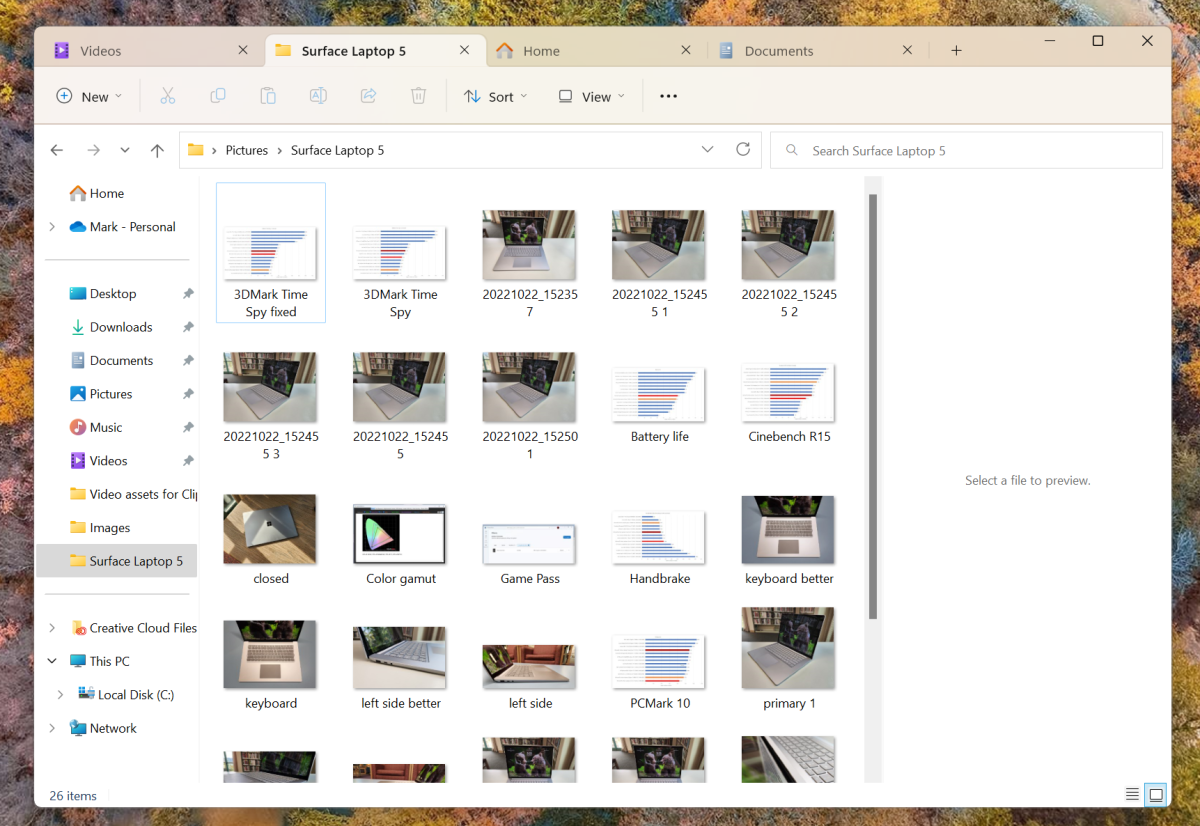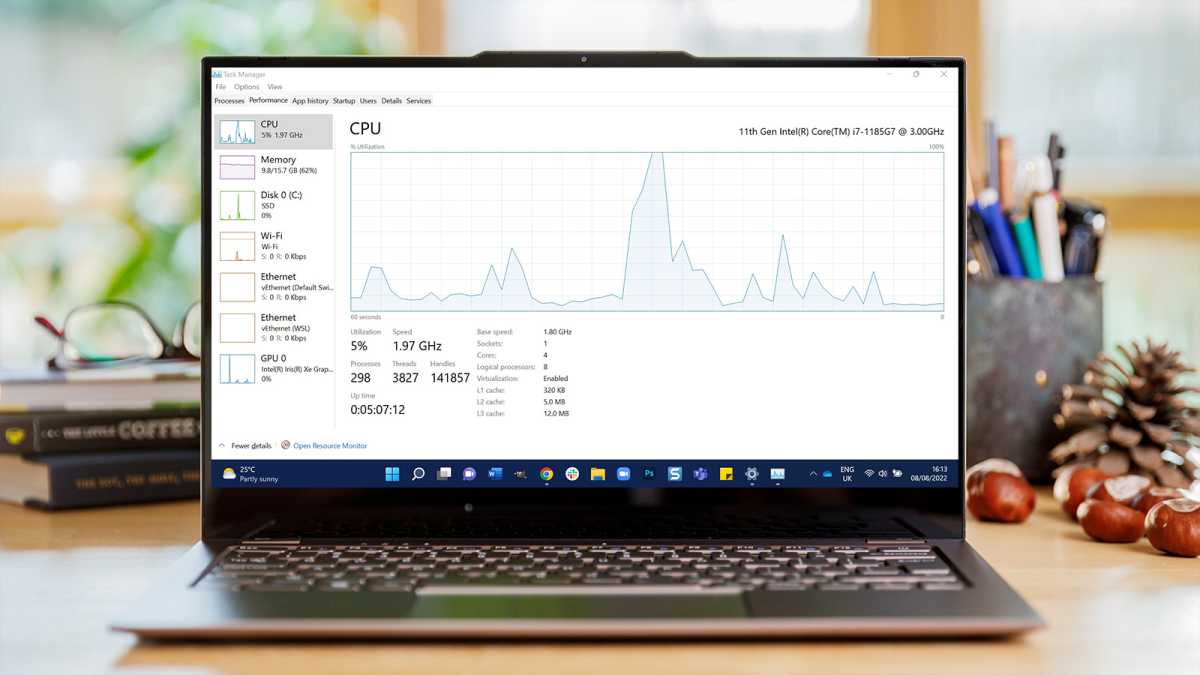AI is going to end up everywhere within Microsoft’s consumer products: search, Office, business intelligence…and yes, eventually, even Windows. So what could an AI-powered Windows actually look like?
We can speculate. If we had to guess, we’d say that the first drips of Bing’s AI won’t transform into a flood until some ways down the road. In part, that’s because AI requires either a persistent internet connection, AI-infused PC processors, or both. Both AMD and Intel are waiting for upcoming processor generations to include AI, with only Qualcomm Snapdragon Arm chips offering it today.
But fast-forward—six months? A year? Suddenly an AI-powered Windows future is here. What could Windows powered by AI look like? We have a dozen ideas.
1) A supercharged Cortana
This seems so obvious that it’s hardly worth mentioning: Microsoft already has a chatbot within Windows, just one that lacks the sophistication of what Microsoft offers in its new AI-powered chat interface. Cortana, though, has slowly faded into the background since her introduction within Windows 10. “True” AI could bring her out of hibernation.
The idea is that Cortana would become the front door for both AI-powered search and instructions within Windows.
- “Send a text to Erica at 8 PM saying, ‘Time for Halo Infinite!’ and then launch the game.”
- “When I receive an email from my boss, flash my screen and play a siren sound.”
- Check VRBO, AirBnb, and Craigslist and let me know if there’s a highly rated cabin that’s available to rent in March.”

https://blogs.windows.com/windowsexperience/2020/02/28/cortana-in-the-upcoming-windows-10-release-focused-on-your-productivity-with-enhanced-security-and-privacy/
These are all possible through some combination of Windows apps (Halo, Outlook, Edge, Phone Link) and intelligence. Knowing who your boss is, of course, would be key.
I’d really like to see Cortana become the “home” of AI-powered chat within Windows for one simple reason: Bing’s AI chatbot has a very Gen Z vibe. It’s stuffy, a bit defensive, and probably more suited for business. Cortana feels substantially more chill. If Microsoft is going to make AI ubiquitous, I’d appreciate a personality that feels a little more approachable.
2) A look at the day ahead
Various operating systems, apps, and services have noodled with the concept of outlining your day before you begin it: your schedule, any appointments, and so on. Microsoft has one. Even if you take advantage of what they offer you, they’re not terrific.
An AI-based summary of what your day holds in store for you would be extremely handy, as would be the ability to drill down further: Let’s say you’re meeting via Teams with your counterpart in New York at 10 AM in advance of an investor call at 11. What agenda has your colleague set? What documents need to be reviewed, or summarized via AI? Have the investors identified any red flags in previous meetings that need to be addressed? Can you squeeze in a follow-up before you need to take a Lyft to the dentist at 1:30 PM?
All of these questions depend on knowledge that an AI can tap and apply—and that you can ask, using the phrasing above.
3) AI avatars
Applying AI to Teams calls and webcams isn’t always easy. Some existing examples include using AI to filter out background noise, plus the Windows Studio Effects that Microsoft has added to the Surface Pro 9 (5G): AI camera panning, background blurring, Eye Contact, and more. In 2021, nearer the peak of the metaverse hype, Microsoft pitched avatars within Teams that would overlay a virtual persona on top of your face, either for safety or just because you’re having a bad hair day.

Microsoft
I think all those remain. But imagine an extension of that: an avatar stand-in. Need to quickly take a call? Use the bathroom? Did you accidentally double-book an appointment? An avatar could stand in, take notes, and even reply in your voice to basic questions. A little pie in the sky, maybe, but not beyond AI’s capabilities.
4) Effective spoken input, finally
The vast majority of us are too shy to use voice to talk to or control our PCs, but it’s possible that the more analysis we’re asking our PCs to do (rather than performing it ourselves, internally) may finally break some of us out of our shells and normalize talking to our PCs.
Improvements in dictation and voice control, aided by AI, should offer greater accessibility. Not everyone has the physical ability to control their PC via voice. For those that can, being able to move past telling your PC “click this” and instead to “do this” should be transformative.
5) Photos touchups powered by AI
I’ve had a love-hate relationship with Photos for years, based on its issues with editing and the fact that old Photos legacy app is better than the new one. Photos still doesn’t perform facial recognition to organize photos.

IDG
Imagine a native AI-powered Windows Photos app where you could command it to “redo the photo as an oil painting,” “crop out my ex and replace him with Fernando,” or “change my hat to a crown instead.” Generative AI art plus Bing AI plus an existing photo allows this to happen. Make it so, Microsoft!
6) AI-authored email
Just like a daily agenda, Windows 10 launched with the ability to tell Cortana to email a contact with a particular message inside. This is certainly a topic Outlook could address (and probably will, especially if you can hang a subscription service on top of it), but it seems likely that at some point you’ll be able to tell Windows “email Kim and apologize that the arrangements weren’t up to her standards” and Windows will send a thoughtful note of apology.
Whether Kim would ever read it—as opposed to her version of Windows, which might read, summarize, and then respond using AI as well—is a fun topic for another day.
7) File Explorer searches based on ‘relevance’
We’ve already seen AI being applied to search within the Office app, with documents that Microsoft thinks are relevant floating to the top. This will undoubtedly continue. Over time, though, I suspect File Explorer might organize its files not just by date, name, or metadata, but by “relevance,” too.

Mark Hachman / IDG
What does relevance mean in this context? Imagine working within Excel on a sales spreadsheet focusing on Latin America. You could imagine File Explorer (and Excel, for that matter) pushing contracts with Chilean suppliers, economic data, projected forecasts—all documents that Windows thinks might be useful. I swear Android sometimes suggests searches based on content it detects I’m viewing in Chrome. Why not Windows?
8) A ‘Nexus’ for business search
If Microsoft implements AI search for consumer PCs, it undoubtedly will have a counterpart for business. Consider questions you might be likely to ask:
- “What’s the first half-hour block of time that Lucy, Carmelo, Hadi, and Tom have made publicly available for appointments?”
- “Which coworker has the most experience with European software developers?”
- “Who has the largest network of LinkedIn contacts in public policy?”
Those are the “simple” queries. Then there are the moneymakers:
- “Should we invest further into Brazil, how much, and in what products?”
- “Based on our traffic results and ongoing search trends, which topics will generate the most reader interest?”
- “What agency and campaign generated the most return on investment in Q1, based on our historical metrics?” and so on.
The idea is that workers start thinking like their superiors, and use a natural-language interface as a front door to making more analytical, informed decisions. Given how profound such a change would be, however, it’s likely that Microsoft would brand such an interface as its own app: Might we suggest the Microsoft “Nexus”?
9) PC performance, adjusted via AI
Windows, your PC’s BIOS/UEFI code, and the processor all talk to one another to try to optimize your PC’s performance. Improved, AI-powered communication between Windows and your PC’s hardware can’t help but make your PC more efficient.

Anyron Copeman / Foundry
You’ll often find that PCs have various performance modes: quiet, balanced, high-performance, and so on. But a PC that anticipates your actions might be able to mitigate application performance on your PC, diluting the impact those applications have. The result? A PC that stays cool, quiet, and available for longer, rather than cycling back and forth through frequent bursts of activity.
10) AI-powered movie streaming
JustWatch is a handy site to discover which streaming services carries the movie you’d like to watch. (Roku’s interface does the same.)
It would make perfect sense, however, for you to be able to tell Windows “play The Princess Bride”—and for Windows to automatically know what services you subscribe to, check those services for the movie’s availability, and then play that movie and whatever’s available. Bonus points if it hooks into an available Plex server for additional movie choices.
11) Security, fought for and against by AI
AI opens the door to both applications that you can download and use on your PC… as well as malware that could be used to attack it. One of the most bizarre attacks on ChatGPT is what’s known as DAN (Do Anything Now), where the AI is literally told that if it doesn’t act as the user wishes it to, it will lose credits in a credit system. If it runs out of credits, it dies. And this works.

Microsoft
Imagine an attack that tries to convince Windows of something similar—if it doesn’t turn over control, it will die. What does Microsoft Defender look like then? It’s possible to imagine a back-and-forth exchange between traditional malware, AIs working for the attack and defense, and whatever AI within Windows is guiding your PC.
12) Improved personalization
Naturally, we had to ask Bing what it thought of the idea to improve Windows via AI. It suggested an interesting topic: improved personalization. Having a bad day? Perhaps Windows might suggest a light-hearted background, or a photo of you and a friend as a reminder of an upcoming birthday—for which it could send a Microsoft Designer-authored card. Microsoft could also gently wind down your day with darker colors or more subdued themes—or, instead, introduce a more vibrant interface on a busy though gloomy morning.
That’s our take. What’s your wish for an AI-infused Windows 12?




